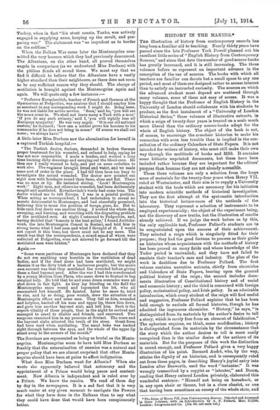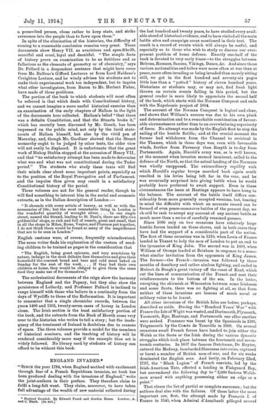HISTORY IN THE MAKING.*
THE illustration of history from contemporary records has long been a familiar aid to teaching. Nearly thirty years have passed since the late Professor York Powell planned out his excellent little series of "English History from Contemporary Sources," and since that date the number of good source-books has greatly increased, and it is still increasing. The three volumes before us represent an important advance in the conception of the use of sources. The books with which all teachers are familiar can devote but a small space to any one period, and most of them are designed rather to arouse interest than to satisfy an instructed curiosity. The sources on which the advanced student must depend are scattered through many volumes, some of them not easy of access. It was a happy thought that the Professor of English History in the University of London should collaborate with his students to produce, as the first instalment of a "University of London Historical Series," these volumes of illustrative extracts, in which a reign of twenty-four years is treated on a scale much more liberal than the ordinary source-books adopt for the whole of English history. The object of the book is not, of course, to encourage the armchair historian to make his researches with even less trouble than is implied in the con- sultation of the ordinary Calendars of State Papers. It is not intended for writers of history, who must still make their own way through the multitude of books and MSS. It contains some hitherto unprinted documents, but these have been included rather because they are important for the editors' purpose than because they are not already accessible.
These three volumes are only a selection from the large mass of materials for the twenty-four years when Henry VII. ruled at Westminster, and their aim is to supply a University student with the tools which are necessary for his initiation into modern scientific methods of historical investigation. They are the first attempt at the systematic introduction into the historical lecture-room of the methods of the laboratory. They represent a. selection of instruments to be employed experimentally; the object of the experiment being, not the discovery of new truths, but the illustration of results already achieved. If we judge the work before us by this, the only applicable test, Professor Pollard's students are to be congratulated upon the success of their achievement. They selected a reign which is singularly fitted for their purpose ; they had the good fortune to possess as their guide an historian whose acquaintance with the methods of history has been proved on many fields and whose knowledge of the Tudor period is unrivalled; and they have not failed to emulate their teacher's care and industry. The plan of the work is doubtless due to Professor Pollard. The first volume contains narrative extracts, chiefly from chronicles and Calendars of State Papers, bearing upon the general political history of the reign; the second includes docu- ments illustrative of Constitutional history and of social and economic history ; and the third is concerned with foreign policy, ecclesiastical policy, and Irish policy. In an admirable introduction, which every student of the reign will find useful and suggestive, Professor Pollard explains that he has been bold enough to exclude all formal histories, though he has admitted the ingenuous chronicler. " History," he says, " is distinguished from its materials by the author's desire to tell a story, which is rarely free from an element of falsification." The aphorism requires, we think, some modification ; history is distinguished from its materials by the circumstance that the story which the author desires to tell is more easily recognized than is the 'similar desire of the authors of its materials. But for the purposes of this work the distinction is sound enough, and Professor Pollard gives a very happy illustration of his point. Bernard Andre, who, by the way, attains the dignity of an historian, and is consequently ruled out from these pages, in describing Henry's joyful entry into London after Bosworth, used the word " laetanter." It was wrongly transcribed by a copyist as " latenter," and Bacon, reading that Henry entered London privately, elaborated this wonderful sentence: "Himself not being on horseback, or in any open chair or throne, but in a close chariot, as one that having been sometimes an enemy of the whole state, and • The Reign of Henry VII. from Contemporary Sources. Selected and Arranged in three volumes, with an Introduction by A. F. Pollard, lion. D.Litt. London: Longmans and Co, [10i. 6d. net each vol.]
a. proscribed person, chose rather to keep state, and strike reverence into the people than to fawn upon them."
In spite of the elimination of the historian, the difficulty of coming to a reasonable conclusion remains very great. These documents show Henry VII. as avaricious and spendthrift, merciful and cruel, loyal and deceitful. " The simple facts of history prove on examination to be as fictitious and as fallacious as the elements of geometry or of chemistry," says Dr. Pollard in a despondent sentence that might have come from Mr. Balfour's Gifford Lectures or from Lord Haldane's Creighton Lecture, and he wisely advises his students not to make their experimental work too independent, but to inquire what other investigators, from Bacon to Mr. Herbert Fisher, have made of these problems.
The portion of the book to which students will most often be referred is that which deals with Constitutional history, and we cannot imagine a more useful historical exercise than an examination of the early chapters of Hallam in the light of the documents here collected. Hallam's belief "that there was a definite Constitution, and that the Stuarts broke it," which has recently been discussed by Mr. Gooch, has been impressed on the public mind, not only by the lucid state- ments of Hallam himself, but also by the vivid pen of Macaulay, and, though Mr. Gardiner showed that the Stuart monarchy ought to be judged by other tests, the older view will not easily be displaced. It is unfortunate that the great work of Bishop Stubbs stopped at the accession of Henry VII., and that "no satisfactory attempt has been made to determine what was and what was not constitutional during the Tudor period." The students who study these texts will find their minds clear about some important points, especially as to the position of the Royal Prerogative and of Parliament, and the impulse thus given may result in a satisfactory Constitutional history of the period.
These volumes are not for the general reader, though he will find something to interest him in the social and economic extracts, as in the Italian description of London :-
" It abounds with every article of luxury, as well as with the necessaries of life ; but the most remarkable thing in London is the wonderful quantity of wrought silver. . . . In one single street, named the Strand, leading to St. Paul's, there are fifty-two goldsmiths' shops, so rich and full of vessels, great and small, that in all the shops in Milan, Rome, Venice, and Florence put together, I do not think there would be found so many of the magnificence that are to be seen in London."
English customs were, of course, frequently misunderstood. The same writer finds his explanation of the custom of send- ing children to be trained as pages in the consideration that
" The English, being great epicures, and very avaricious by nature, indulge in the most delicate fare themselves and give their household the coarsest bread and beer and cold meat baked on Sunday for the rest of the week. . . . If they had their own children at home, they would be obliged to give them the same food they make use of for themselves."
The ecclesiastical documents of the reign show the harmony between England and the Papacy, but they also show the persistence of Lollardy, and Professor Pollard is inclined to range himself with those who believe in a continuity from the days of Wycliffe to those of the Reformation. It is important to remember that a single chronicler records, between the years 1496 and 1505, twenty-seven cases of heresy in London alone. The Irish section is the least satisfactory portion of the hook, and the extracts from the Book of Howth come very near to the historian who writes to tell a story; but the inade- quacy of the treatment of Ireland is doubtless due to reasons of space. The three volumes provide a model for the members of historical seminars, and the teaching of history will be rendered considerably more easy if the example thus set is widely followed. No library used by students of history can afford to be without this book.







































 Previous page
Previous page